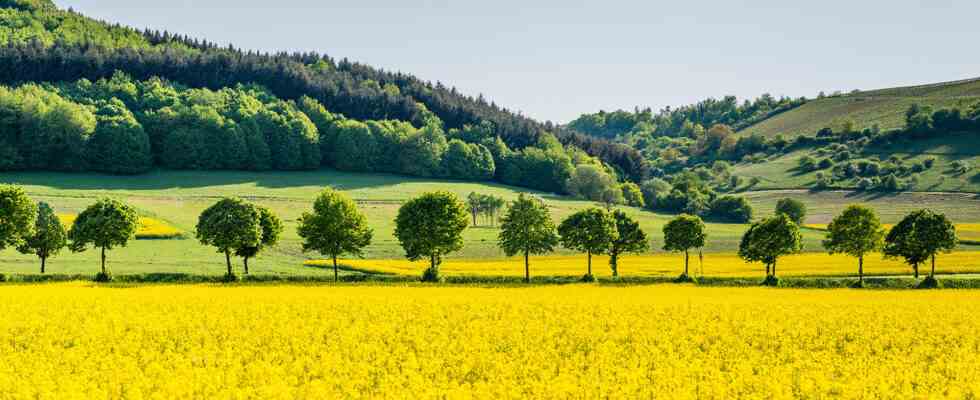Status: 05/30/2022 08:12 a.m
German farmers expect a good rapeseed harvest. Because of the consequences of the Ukraine war, prices have skyrocketed at the same time. Edible oils are scarce in some places. How are producers reacting to this?
Germany glows yellow – rapeseed fields as far as the eye can see, almost 46,000 hectares in Hesse alone. In the middle of the Hessian granary, the Wetterau, farmer Jan-Peter Loth cultivates 200 hectares of it. His harvest promises to be good. There are currently full market prices for this. He calls what’s growing in his fields “hot hugged”. “The market is going completely crazy,” he says. “The majority of farmers have never experienced that. Not for decades!”
Rapeseed price at record high
Rapeseed is currently the winner of the oil crop because there are no exports from Ukraine. Agricultural economist Stephan von Cramon-Taubadel from the University of Göttingen analyzes the market and prices will remain high. “Also because one anticipates that there will be a lack of quantities in the next harvest and probably also in the harvest after that. If only because there will hardly be any more sowing.”
A look at the commodity futures exchange shows an average price of 850 euros per ton for rapeseed these days. At the beginning of the year, a ton was traded for just a third of this price.
Farmers don’t gamble
But farmer Loth makes it clear: he doesn’t get this market price for a long time, because the silos are empty. He had already sold the goods in their entirety last summer – for half the current price. He has signed a contract with a producer group for his upcoming harvest. That’s what a lot of farmers do.
“Very few,” he says, “are gamblers.” He explains that the contracts give him security, also to be able to plan with the money. “Agriculture is always a high risk,” he adds, pointing to the sky. There is still a balance between rain and sun.
Golden times for rapeseed
The producer group pays him 600 euros per ton for the rapeseed that is still on his fields. That’s almost 43 percent more than the year before. “After many years, that’s finally good news,” says Loth happily – but then he adds what all farmers are currently saying: “The increased operating resources are reducing profits.”
The diesel prices were dizzying, seeds were also on the rise – and then fertilizer, the number one problem child. “I can’t say that we only fertilize half, then at some point we only harvest half. So we have to bear the costs and hope that we can recover them from the proceeds,” explains Loth. In the end, only 17 percent of the 43 percent additional income remained for the producer, the farmer calculates. In return, the consumer price for cooking oil rose by 30 percent.
Although things are going better with rapeseed than with his sugar beets, Loth still wants to keep to the crop rotation. He will not grow any more rape. Other farmers see things very differently. While there were 80,000 hectares of oil fruit nationwide last year, this year there are a good one million. The reason: Even before the Ukraine war, rapeseed was lucrative for farmers.
Plate, trough or tank?
The question of where the rape ends up is also coming to a head. Rather on the plate or in the tank? Biodiesel or cooking oil? “I feel like a food producer,” says farmer Loth. “But of course,” he adds, “in my opinion, the energy from the oil is just as important. Sustainability as well as nutrition.”
According to the farmers’ association, 40 percent of the rapeseed harvest is processed into cooking oil and biodiesel. The remaining pressing residue of 60 percent ends up in the animal feed industry for cows and poultry – also because the plant is so rich in protein. Processing in Germany replaces feed imports. However, individual oil mills are increasingly concentrating on the production of cooking oil, as research by the Hessian radio revealed. In the wake of the war, fuel production from food has fallen into disrepute.
“This conflict is shifting everything”
The federal government finds itself in a conflict of objectives. After all, it is important both to overcome the fossil fuel crisis and to ensure that the supply of food is secured. “This conflict is shifting everything”, agricultural market analyst von Cramon-Taubadel is certain, “away from biofuels towards human food. That will be the way of the future.”
In the meantime, the federal government is thinking aloud about massively shutting down agricultural fuel. This discussion immediately caused the rapeseed prices on the stock exchange to fall. In just two trading days, the price fell by EUR 50 to EUR 824 per ton. The Hessian rapeseed farmer Loth observes the whole thing with eagle eyes. Although his contracts are firm, he already has to think about the next harvest in 2023, and that will be sold well before sowing.
degree of self-sufficiency in Germany
The Ukraine war has massive consequences for the agricultural economy. But to what extent does Germany actually depend on global supply? Surprisingly, the Federal Republic could be completely self-sufficient for many important foods. For potatoes, sugar and meat, the level of supply is well over 100 percent. A full supply is also guaranteed for grain. But in other areas the self-sufficiency rate collapses dramatically: for vegetables it is only 36 percent, for oils and fats it is 26 percent and for fruit it is only 20 percent.

